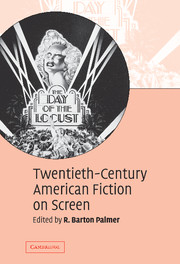Book contents
- Frontmatter
- Contents
- List of illustrations
- Notes on contributors
- Acknowledgments
- Introduction
- 1 Filming an unfinished novel: The Last Tycoon
- 2 The texts behind The Killers
- 3 The Day of the Locust: 1939 and 1975
- 4 Ship of Fools: from novel to film
- 5 Intruder in the Dust and the southern community
- 6 Dramatizing The Member of the Wedding
- 7 Film and narration: two versions of Lolita
- 8 World War II through the lens of Vietnam: adapting Slaughterhouse-Five to film
- 9 John Huston's Wise Blood
- 10 Genre and authorship in David Cronenberg's Naked Lunch
- 11 Screening Raymond Carver: Robert Altman's Short Cuts
- 12 The Color Purple: translating the African-American novel for Hollywood
- 13 The specter of history: filming memory in Beloved
- 14 Filming the spiritual landscape of James Jones's The Thin Red Line
- Filmography
- Index
- References
10 - Genre and authorship in David Cronenberg's Naked Lunch
Published online by Cambridge University Press: 12 January 2010
- Frontmatter
- Contents
- List of illustrations
- Notes on contributors
- Acknowledgments
- Introduction
- 1 Filming an unfinished novel: The Last Tycoon
- 2 The texts behind The Killers
- 3 The Day of the Locust: 1939 and 1975
- 4 Ship of Fools: from novel to film
- 5 Intruder in the Dust and the southern community
- 6 Dramatizing The Member of the Wedding
- 7 Film and narration: two versions of Lolita
- 8 World War II through the lens of Vietnam: adapting Slaughterhouse-Five to film
- 9 John Huston's Wise Blood
- 10 Genre and authorship in David Cronenberg's Naked Lunch
- 11 Screening Raymond Carver: Robert Altman's Short Cuts
- 12 The Color Purple: translating the African-American novel for Hollywood
- 13 The specter of history: filming memory in Beloved
- 14 Filming the spiritual landscape of James Jones's The Thin Red Line
- Filmography
- Index
- References
Summary
When David Cronenberg adapted William Burroughs's (1924–1997) Naked Lunch (1959) for the screen in 1991, the result was a film self-consciously exploring its own status as an adaptation. Cronenberg himself calls it “an exercise in analyzing the difference between the two media … writing and cinema,” a programmatic statement considering the film's interest in authors and their writing machines, the competition and collaboration among authors, and the origins of creativity in addiction, sexuality, personal and historical trauma, and insanity. In one scene of the film, the writer Tom Frost, played by Ian Holm and modeled on Paul Bowles, asks Bill Lee, the William Burroughs stand-in played by Peter Weller, whether it is true that he shot his wife. “How did you know?” Lee asks. “Word gets around,” Frost replies. It is this reply, enigmatic and overdetermined, that provides a striking metaphor for all adaptations. Even more so, it encapsulates Cronenberg's self-conscious approach to Naked Lunch. When it comes to writing and filmmaking, to the process of adaptation itself, texts travel – word does indeed get around.
Apart from the larger thematic issues in Naked Lunch, the film also represents a crucial step in a process of authorial self-(re)fashioning in the career of its director, David Cronenberg. Apart from the director's deep personal investment in the material, which makes watching the film a strangely intimate experience, it also gives Cronenberg an opportunity to shape his public persona and position himself self-consciously as a political filmmaker.
- Type
- Chapter
- Information
- Twentieth-Century American Fiction on Screen , pp. 170 - 185Publisher: Cambridge University PressPrint publication year: 2007



